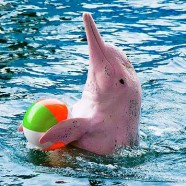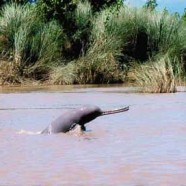“On the Trail” n°6
Wildlife is bubbling
“On the Trail” n°6, 134 pages of beauty and cruelty
Information and Analysis bulletin on animal poaching and smuggling.
Whales and marine mammals, pages 8 and 9
Open parcels and find poisonous scorpions, search a shop in Malaysia and stumble on a vial of elephant sperm, find out about the latest trafficker’s tricks, meet the rhino mafia, hunt the MGM lion and discover the Tibetan Wild Ass, or Kiang.
Introduction: Several recent studies suggest that violence on animals and abuse of animal’s weakness show predisposition to violence against humans and that witnessing domestic violence or being submitted to parental harassment leads to a predisposition to violence against animals. Violence is a viral and vicious circle …
“On the Trail” n°5
We are pleased to announce the publication of the 5th edition of « On the Trail », Information and analysis bulletin on animal poaching and smuggling.
1st April – 30th June 2014. 132 pages, 506 events.
Whales and marine mammals, pages 10 to 12
English version (pdf 7,2 Mo):
https://robindesbois.org/wp-content/uploads/ON_THE_TRAIL_5.pdf
Numerous messages have been sent to Robin des Bois from Africa, Asia, Europe and the American continent. They come from Custom officers, CITES delegates, governmental institutions, Non-Governmental Organizations and from the general public. They all testify to the usefulness of “A la Trace” and the English version “On the Trail”, », Information and analysis bulletin on animal poaching and smuggling.
“On the Trail” n°4
Here now the 4th edition of « On the Trail »
Information and analysis bulletin on animal poaching and smuggling.
1st January – 31th March 2014.
112 pages, 468 events, 352 information sources.
Whales and marine mammals, pages 12 to 14
All dials are in the red. On the endangered species market prices are soaring. China and the world exotic pet trade are weighing heavily. The red-fronted parrot in Congo smuggled by Blue Helmets are sold for 800 US$ on Internet. Rhino horns reach 100,000 US$/kg, leopard skin more than 30,000 US/$. Mumbai golden youth gets high on cobra venom (180,000 US$/l). Isilo, the elephant who became a symbol of South Africa, is dead. His 2 tusks worth 600,000 US$ have disappeared. Poachers were the first to find his body by spotting the vultures. Suspicion lingers. Daytime rangers become night-time poachers. Prices go wild, the violence does also. Animals, thieves and rangers fall. Traffickers kill each other like traffickers of a drug cartel. Gangs rule, gangrene thrives. This is war. Justice is incoherent. From severe punishment to set an example to a mere bail, justice sometimes goes astray. Traffickers are often very young. Poachers ride BMWs. Killing methods are both modern and archaic.
Science too Lethal
The International Court of Justice ordered Japan to stop its whaling program JARPA II and therefore cease all whaling activities in the Antarctic. Since 1987, Japan has killed over 10,000 whales in the Southern Seas.
In its decision delivered this morning, at The Hague, the Court declared that the “scientific whaling” program in Antarctica, as it has been designed and implemented by Japan, entails a disproportionate number of whales hunted and killed. According to the Court, Japan did not provide adequate explications to justify the lethal take of whales particularly minke whales. The Court pointed out that the number of whales killed under the framework of “Japanese scientific whaling” is offset by financial reasons. The product from treating whales – which is to say the commercialization of whale meat – finances the whaling campaign carried out by the factory ship the Nisshin Maru and support vessels.
“On the Trail” n°3
“On the Trail” n°3
Whales and marine mammals, pages 4 and 5
Robin des Bois is pleased to present to you the third edition of “On the Trail”, a quarterly information and analyses bulletin on animal poaching and smuggling (pdf 80 p. 4.5 Mo).
“On the Trail” n°2
Take a trip of beauty and cruelty in the following 80 pages (pdf. 4Mo), swing through the trees with the supreme pleated gibbon, still at liberty in the wild despite being endangered, get to the bottom of cyanide and of poisoned pineapples, survive the etorphine laced arrows, scheme with furniture dealers looking for ivory, discover the cunning tiger trappers, hunt down blackbucks with Bollywood stars, cruise towards China with 2,000 saiga antelope horns worth 22 million dollars, look into the eyes of a baby chimpanzee in a pathetic plastic bag at a Cameroon market, entrench yourselves in the fate of thousands of birds and animals unwilling migrants forcefully removed from their habitats, float down a river with a mutilated elephant carcass and find out about France’s stance on the future of illegal ivory stockpiles, eat Ganges river dolphin meat, pay homage to rangers and forest guards murdered in the wild by poachers …
Whales and marine mammals, pages 5 and 6
Robin des Bois will Pursue them via “On the Trail”
Today, Robin des Bois, the Paris based NGO, released the 1st edition of “On the Trail”, a quarterly information and analysis bulletin on poaching and smuggling of endangered animals.
206 events of poaching, seizures, arrests and convictions which occurred in Africa, Australia, America, Europe and Asia are listed. This panoramic vision of cruelty and criminal acts on wildlife, between April 1 and June 30, 2013 makes one shiver and deliberate.
Not on the Same Whale Wave
Information note n°8
Whales at the International Court of Justice
The Hague, The Netherlands, 2nd hearing of Japan, July 15th – 16th
Over the last 3 weeks, at the Peace Palace in The Hague (Netherlands), the past and the future of whaling has been explored in all its scope. In their closing remarks on July 16th, Japan implied that if the Court declared a decision in favour of Australia’s case, it would be the equivalent of forcing a State to abide to a decision that they did not agree to. On this note they reemphasized that when they agreed to the 1982 moratorium, which came into force for Japan in 1986, it was uniquely in light of this provision being reviewed. If Japan was to wake up one morning and find that the Convention that they agreed on had changed over night then the only way out would be to leave.
Australia: Fights Back
Information note n°7
Whales at the International Court of Justice
The Hague, The Netherlands, 2nd hearing of Australia, July 9th – 10th
The second round of hearings for Australia was presented from July 9th to July 10th and announced a call to order in the Court by the Attorney-General of Australia, Marc Dreyfus. Australia’s return to the stand signalled the return, in force, of clear legal arguments. Australia restated that their case was “about the failure of one country to comply with its international legal obligations not to conduct commercial whaling, an obligation which that country accepted voluntarily but then immediately began to subvert.” Australia also hammered down the unfounded arguments that Japan had unjustly presented against them in their first round of hearings.












